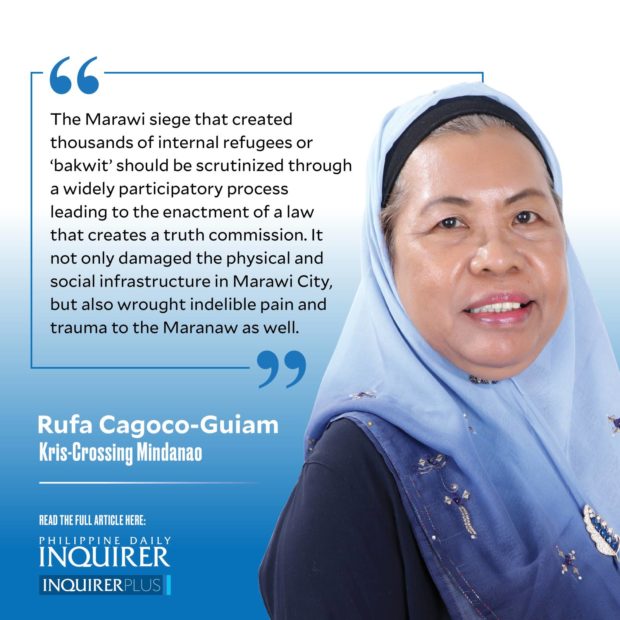‘Bakwit’ forever? (3)
One of the most internationally recognized and acknowledged as a successful attempt at dealing with massive human rights abuses by state actors is the establishment of the Truth and Reconciliation Commission (TRC) in South Africa in 1995. It was legislated during the administration of former South African president F.W. de Klerk, elected in 1990.
The TRC was established through the Promotion of National Unity and Reconciliation Act No. 34 of 1995. A court-like body, the TRC was created to “help heal the country and bring about a reconciliation of its people by uncovering the truth about human rights violations” that had occurred during the period of apartheid in South Africa. It was not perfect, as shown in various reports that detailed the weaknesses of this effort. But it was a significant and participatory way of addressing historical injustices of a victimized population.
“Apartheid,” (literally “apartness”) is the Afrikaans term that white-ruled South Africa’s Nationalist Party in 1948 used to refer to the country’s punitive, oppressive, and institutionalized system of racial segregation. Under this harsh racial segregation policy, the majority and native black South Africans, as well as minority “colored races,” like Indians and Pakistanis, were not entitled to the same privileges and benefits white South Africans enjoyed. Black South Africans had to use separate entrances to public buildings, and were contained in segregated communities apart from the minority white population. Many of them were victims of state police indiscriminate violent actions.
Victims of massive atrocities committed by state actors (military and police, including paramilitary groups) are entitled to know the truth of why they were victimized, or if they have died as a result of such atrocities, their survivors and relatives have the right to know the circumstances and motivations of the state agents that committed such grave abuses. This is one of the key pillars of transitional justice (TJ). TJ is an approach and methodology that helps societies that have gone through a violent past of grave human rights violations move toward a future that is built on transparency and accountability for what happened in the past. Such wrongs have to be addressed through mechanisms for social healing and conflict transformation.
The creation of the South African TRC was a crucial step in the TJ process that paved the way for a more inclusive and widely participatory democratic governance in South Africa that saw the election of its very first black President, Nelson Mandela.
Accompanying a truth commission is the establishment of legislated mechanisms that provide for the healing of wounded communities—like giving justice to the victims, through a package of both material and nonmaterial reparations program, not only for the immediate families of the victims but of the community as well. But more than the material and financial reparations is the state’s acknowledgment of the grave abuses of its agents against its perceived enemies (like the blacks in the South African case). This entails the act of expressing apologies for a past atrocity by the sitting head of state.
The Marawi siege that created thousands of internal refugees or “bakwit” should be scrutinized through a widely participatory process leading to the enactment of a law that creates a truth commission. It not only damaged the physical and social infrastructure in Marawi City, but also wrought indelible pain and trauma to the Maranaw as well. It demonstrated how the folly of a sitting president can bring about havoc among a group of people perceived to be coddling “drug lords” and “terrorists,” the current labels for apartheid-like state enemies.
Sadly, the Marawi Siege Victims Compensation Act of 2022 does not provide for a truth commission. Moreover, it does not require the former president who ordered the five-month daily bombardment in Marawi in 2017 to issue a public apology. Since the sitting head of state, President Marcos Jr. is the son of the former dictator who launched more than a decade of grave human rights abuses during martial law from 1972 to 1986, the Marawi bakwit will never see the day similar to the public trials conducted by South Africa’s TRC.
They are “bakwit forever” until they die.
Comments to rcguiam@gmail.com





















